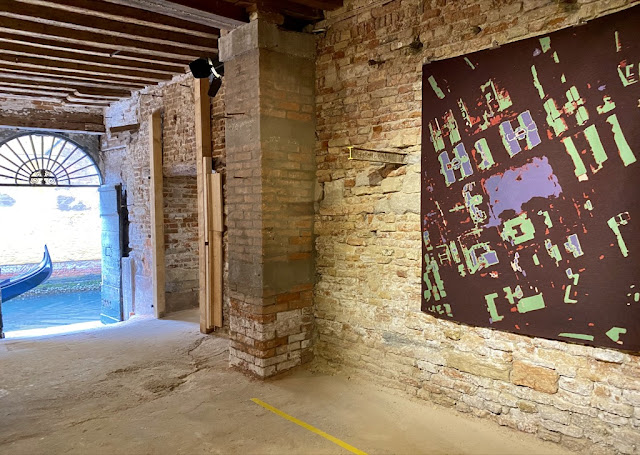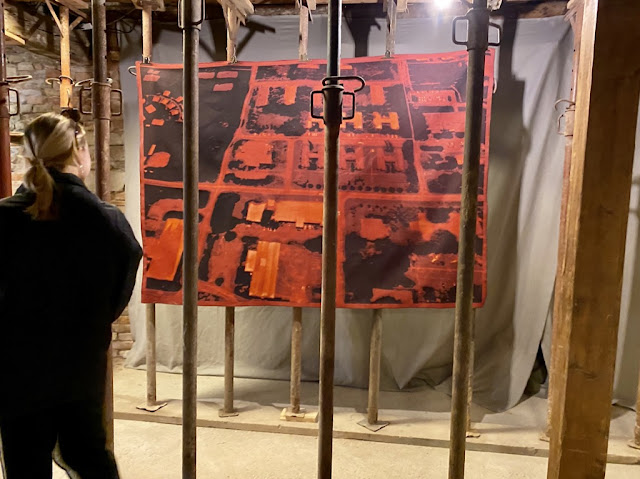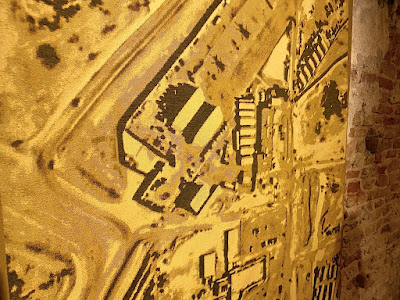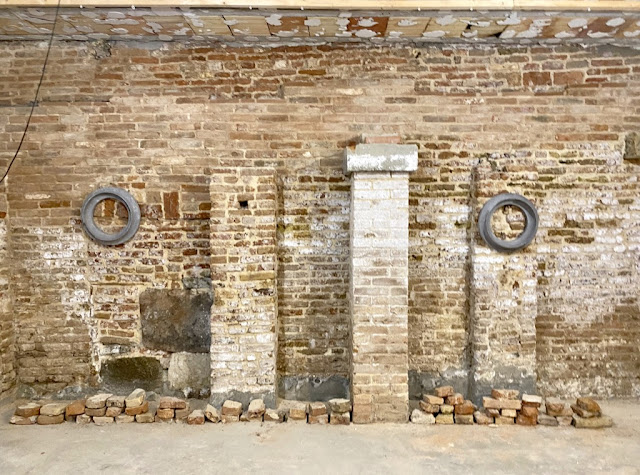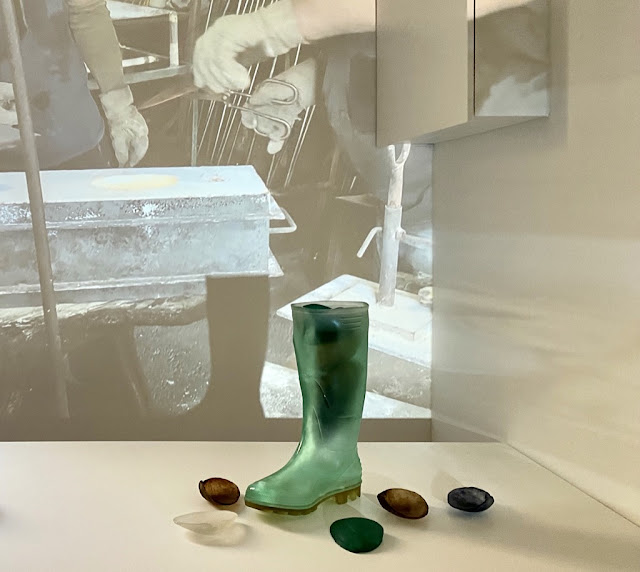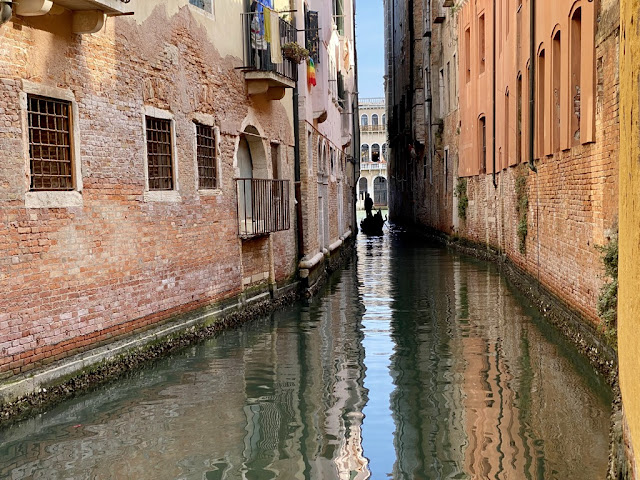Biennale Arte 2022 - Beatrice Burati Anderson - Art Space
Si Vis Pacem - If You Want Peace - Exhibitions
Ciriaco Campus - Italo Zuffi
At the Beatrice Burati Anderson Art Space - two exhibitions curated by Adriana Polveroni - until September 24 - Si Vis Pacem - If you want peace - responds to the drama of the present times, comparing in an unprecedented way the works of Ciriaco Campus - Bitti - Nuoro - 1951 and Italo Zuffi - Imola - 1969. Borrowing the title from the famous Latin phrase - Si vis pacem para bellum - If you want peace, prepare for war, Si Vis pacem asks, in the deliberate suspension of the sentence, an implicit question, which will remain open, to constantly solicit conscience: If you want Peace - assuming you really want peace - what needs to be done.
Ciriaco Campus - Tapestry
Ciriaco Campus - Si Vis Pacem - If You Want Peace - tapestry
Ciriaco Campus and Beatrice Burati Anderson
"Ciriaco Campus makes visible military bases normally hidden from the eyes of us who inhabit the world, causing something to emerge on the surface, just like a sort of excrescence of the soil, suitably kept hidden and perhaps denied. And he does so using an ancient language of art: the tapestry, which once decorated the walls of noble residences to narrate feats, proud deeds of leaders or territories explored and therefore codified."
Adriana Polveroni
curator
Ciriaco Campus - Si Vis Pacem - If You Want Peace - tapestry
"In Campus's hands, however, the tapestry lends itself to another vision, not at all noble and that we
can indeed imagine the epicenter of sordid, and not only hidden, trafficking. And it does so
deliberately with bright colors, sometimes acidic, as if to contrast with this strong
chromatic choice what would like to remain invisible."
Adriana Polveroni
Adriana Polveroni
Ciriaco Campus - Si Vis Pacem - If You Want Peace - tapestry
Si Vis Pacem - If You Want Peace - Exhibitions
Part of the Homo Faber In Citta program - the exhibition - Do You Know What I mean? - showcases the relationship between glass Masters and artists is explored. A selection of glass works by some Venetian or Venice based artists – who have a strong relationship with the glass masters they have been working with in Murano for years - like - Zilio - Berengo - Giuman – are examined. The show explores the association between craftsmen and artists: the glass artworks are points of departure to go back to the creative process, surrounded by videos of the masters at work and interviews. How does the artist explain what he wants? What’s the very personal contribution of the artisan to the artistic outcome? Live talks between artists and artisans were held in the gallery.
Ciriaco Campus - Italo Zuffi
Adriana Polveroni - curator
Italo Zuffi, consistent with the conceptual declination of his work and with a more
"peripheral" and less central vision, with his subtly oblique gaze, proposes an image of
untruth, or rather of ambiguity, which relies precisely on the promise of certainty given to
us by mass media. Four stoneware circles, apparently useless and indecipherable
objects hanging on the wall, tell, with interruptions and uneven edges, the preferences,
expressed in percentages, of various polls proposed to public opinion regarding whether or
not people are in favor of euthanasia, prefer to win the Scudetto or the participation of their
favorite team in the Champions League.
Italo Zuffi - Si Vis Pacem - If You Want Peace
But there is more, to Italo Zuffi's works since ambiguity also belongs intimately to the world of art. So, almost as
a counterpoint to the theme treated so far and not without a certain irony, he proposes the phonetic and graphic shift, played with the names of some artists, perhaps
creating new personalities: Michael Craig-Martin Creed, Agnes Martin Kippenberger, Janine
Antoni Muntadas. And so on confusing.
Italo Zuffi - Si Vis Pacem - If You Want Peace
Beatrice Burati Anderson - Gallery
Calle de la Madonna 1976 - Venice
Do You Know What I Mean? - Exhibition
The BARTA boat - Boat - Art - Anderson - is ready to take you across the little canal to Beatrice Burati Anderson's other Gallery - Calle de la Madonna 1976 - San Polo - where the other exhibition - entitled - Do you know what I mean? - a group show - part of the Homo Faber in Citta program.
Giovanni Rossi di Schio and Gaia Zadra
Part of the Homo Faber In Citta program - the exhibition - Do You Know What I mean? - showcases the relationship between glass Masters and artists is explored. A selection of glass works by some Venetian or Venice based artists – who have a strong relationship with the glass masters they have been working with in Murano for years - like - Zilio - Berengo - Giuman – are examined. The show explores the association between craftsmen and artists: the glass artworks are points of departure to go back to the creative process, surrounded by videos of the masters at work and interviews. How does the artist explain what he wants? What’s the very personal contribution of the artisan to the artistic outcome? Live talks between artists and artisans were held in the gallery.
Andrew Huston - artist
Alessia Alvera and Gianluigi Colin
Tristano de Robilant
